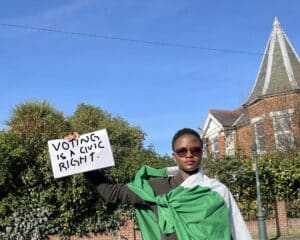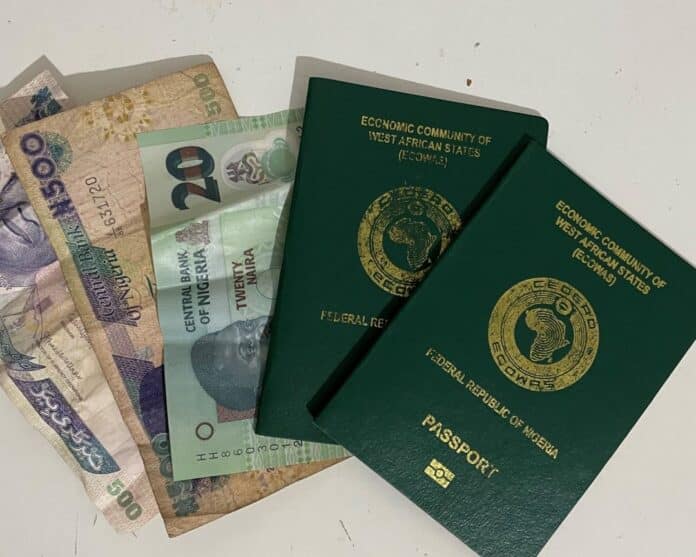With just a few days till Nigeria’s presidential election, Nigerian young people living all over the United Kingdom (UK) have expressed their dissatisfaction at not being able to vote in what they consider to be the most important election in history.
The election, which is set for February 25, 2023, will ‘deprive Nigerians living abroad of their civic rights’, Nigerian native Tabe Agbor, who resides in Bournemouth, said.
Unlike many other general elections since 1999, when Nigeria began to practice democracy, this year recorded an unprecedented level of youth involvement. Many of these young Nigerians are keen on electing Peter Obi – a Labour Party candidate who they believe is the most equipped to address Nigeria’s pressing issues, such as inflation, insecurity, poverty, and corruption, as well as end decades of rule by the two major political parties. Labour’s Peter Obi is currently leading in the polls, but Nigeria’s complex electoral laws which require a spread of votes across the country – with more than a quarter of ballots needing to be cast in at least two-thirds of Nigeria’s states, means the outcome is far from certain.
According to Chinwendu, a PR expert from Nigeria, amidst the economic unpredictability and insecurity afflicting the nation, the younger generation is awake and prepared to ‘take their nation’ from the hands of the older generation (represented by the two traditional parties – the All Progressives Congress (APC) and Peoples Democratic Party (PDP) ‘who have let the country down’. Chinwendu added that many young people are voting in this election to say ‘enough of the vicious cycle of nothingness’ and to demand a leader who actually empathises with Nigerians.
Regrettably, many of these young people won’t be physically present on Nigerian soil in February 2023, making it impossible for them to vote. Doyin Anjorin, a Nigerian living in Bristol, voiced his anger by bitterly criticising the absence of diasporan voting. He declared: ‘As a Nigerian first before an immigrant, it saddens me anytime I remember that I won’t be able to elect the next government in my country. Every country should allow its citizens to vote anywhere they find themselves’.
With no apparent resolution in sight, the subject of diasporan voting has dominated the Nigerian political scene for more than ten years. Some influential political figures including Abike Dabiri-Erewa, Chairman and Chief Executive of the Nigerians in Diaspora Commission, believe that this should be a positive development because there are ‘many more advantages than disadvantages’ she told Arise TV; however, many legislators have continued to oppose allowing expatriate Nigerians to vote for ambiguous reasons. The Nigerian National Assembly ‘overwhelmingly voted against’ the Diasporan Voting, according to Uchechukwu, who wrote about it in a publication of the International Center for Investigative Research (ICIR).
The disenfranchisement is particularly infuriating to most Nigerian youth in the UK at this time given the perceived significance of this year’s election. ‘This election is quite a pivotal one and it would be great to hear all voices’. Given that migration is typical of the younger population – a group of people who have ‘first-hand experience of what currently is and have strong views on continuity or a change’, a diasporan voting system would have given more youths the opportunity to exercise their civic right, Ifelade Ayodele – a London based Nigerian Youth pointed out.
The UK is home to many eligible Nigerians. Statista data indicates that as of 2021, there were roughly 178 thousand eligible Nigerian nationals living in the United Kingdom; this number is expected to have increased in the last two years – with many Nigerians opting to study in the UK. This is just a portion of the total 17 million Nigerians who live abroad; a sizable proportion that would have had a substantial impact on the election’s results.
Nigerian pressure groups in the UK have also persisted in campaigning for diasporan voting and hold out hope that their aim may one day be realised.
It is extremely concerning that a nation with a population of over 200 million people and the largest economy in Africa, still lacks the political will to allow voting from abroad, while other nations that look up to it have understood the value of allowing every citizen, regardless of where they live, the opportunity to have a say in who leads them.

Join us in helping to bring reality and decency back by SUBSCRIBING to our Youtube channel: https://www.youtube.com/channel/UCQ1Ll1ylCg8U19AhNl-NoTg and SUPPORTING US where you can: Award Winning Independent Citizen Media Needs Your Help. PLEASE SUPPORT US FOR JUST £2 A MONTH https://dorseteye.com/donate/







